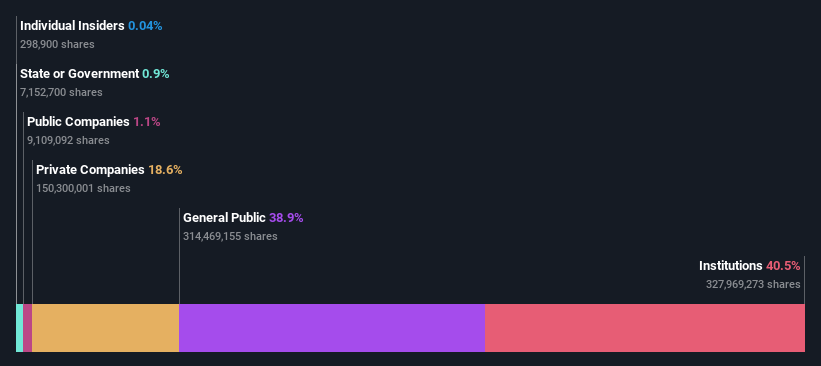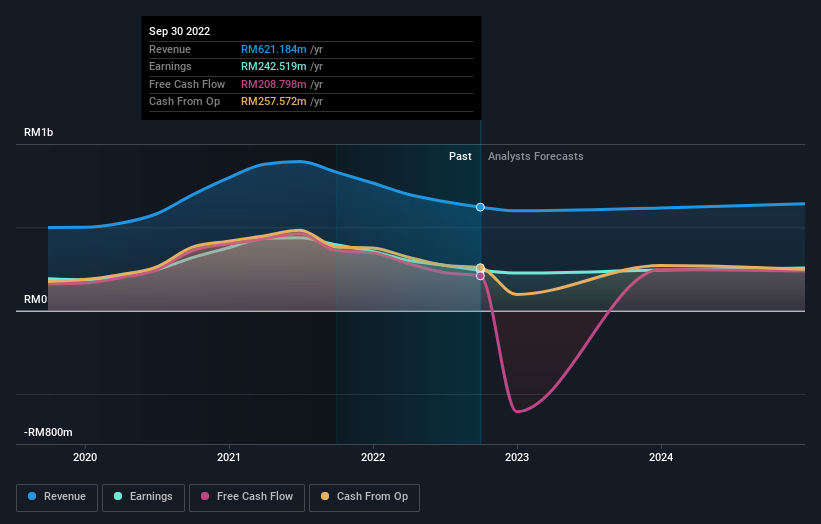Institutional investors have a lot riding on Bursa Malaysia Berhad (KLSE:BURSA) with 41% ownership
Every investor in Bursa Malaysia Berhad (KLSE:BURSA) should be aware of the most powerful shareholder groups. We can see that institutions own the lion's share in the company with 41% ownership. Put another way, the group faces the maximum upside potential (or downside risk).
And as as result, institutional investors reaped the most rewards after the company's stock price gained 7.1% last week. The gains from last week would have further boosted the one-year return to shareholders which currently stand at 14%.
In the chart below, we zoom in on the different ownership groups of Bursa Malaysia Berhad.
See our latest analysis for Bursa Malaysia Berhad
What Does The Institutional Ownership Tell Us About Bursa Malaysia Berhad?
Institutional investors commonly compare their own returns to the returns of a commonly followed index. So they generally do consider buying larger companies that are included in the relevant benchmark index.
As you can see, institutional investors have a fair amount of stake in Bursa Malaysia Berhad. This implies the analysts working for those institutions have looked at the stock and they like it. But just like anyone else, they could be wrong. If multiple institutions change their view on a stock at the same time, you could see the share price drop fast. It's therefore worth looking at Bursa Malaysia Berhad's earnings history below. Of course, the future is what really matters.
Bursa Malaysia Berhad is not owned by hedge funds. Our data shows that Capital Market Development Fund is the largest shareholder with 19% of shares outstanding. Kumpulan Wang Persaraan is the second largest shareholder owning 11% of common stock, and Employees Provident Fund of Malaysia holds about 9.9% of the company stock.
We also observed that the top 8 shareholders account for more than half of the share register, with a few smaller shareholders to balance the interests of the larger ones to a certain extent.
While it makes sense to study institutional ownership data for a company, it also makes sense to study analyst sentiments to know which way the wind is blowing. Quite a few analysts cover the stock, so you could look into forecast growth quite easily.
Insider Ownership Of Bursa Malaysia Berhad
While the precise definition of an insider can be subjective, almost everyone considers board members to be insiders. Management ultimately answers to the board. However, it is not uncommon for managers to be executive board members, especially if they are a founder or the CEO.
Most consider insider ownership a positive because it can indicate the board is well aligned with other shareholders. However, on some occasions too much power is concentrated within this group.
Our information suggests that Bursa Malaysia Berhad insiders own under 1% of the company. However, it's possible that insiders might have an indirect interest through a more complex structure. It's a big company, so even a small proportional interest can create alignment between the board and shareholders. In this case insiders own RM2.1m worth of shares. Arguably, recent buying and selling is just as important to consider. You can click here to see if insiders have been buying or selling.
General Public Ownership
The general public, who are usually individual investors, hold a 39% stake in Bursa Malaysia Berhad. While this group can't necessarily call the shots, it can certainly have a real influence on how the company is run.
Private Company Ownership
It seems that Private Companies own 19%, of the Bursa Malaysia Berhad stock. Private companies may be related parties. Sometimes insiders have an interest in a public company through a holding in a private company, rather than in their own capacity as an individual. While it's hard to draw any broad stroke conclusions, it is worth noting as an area for further research.
Next Steps:
It's always worth thinking about the different groups who own shares in a company. But to understand Bursa Malaysia Berhad better, we need to consider many other factors. Case in point: We've spotted 2 warning signs for Bursa Malaysia Berhad you should be aware of.
But ultimately it is the future, not the past, that will determine how well the owners of this business will do. Therefore we think it advisable to take a look at this free report showing whether analysts are predicting a brighter future.
NB: Figures in this article are calculated using data from the last twelve months, which refer to the 12-month period ending on the last date of the month the financial statement is dated. This may not be consistent with full year annual report figures.
Have feedback on this article? Concerned about the content? Get in touch with us directly. Alternatively, email editorial-team (at) simplywallst.com.
This article by Simply Wall St is general in nature. We provide commentary based on historical data and analyst forecasts only using an unbiased methodology and our articles are not intended to be financial advice. It does not constitute a recommendation to buy or sell any stock, and does not take account of your objectives, or your financial situation. We aim to bring you long-term focused analysis driven by fundamental data. Note that our analysis may not factor in the latest price-sensitive company announcements or qualitative material. Simply Wall St has no position in any stocks mentioned.
Join A Paid User Research Session
You’ll receive a US$30 Amazon Gift card for 1 hour of your time while helping us build better investing tools for the individual investors like yourself. Sign up here

 Yahoo Movies
Yahoo Movies 

